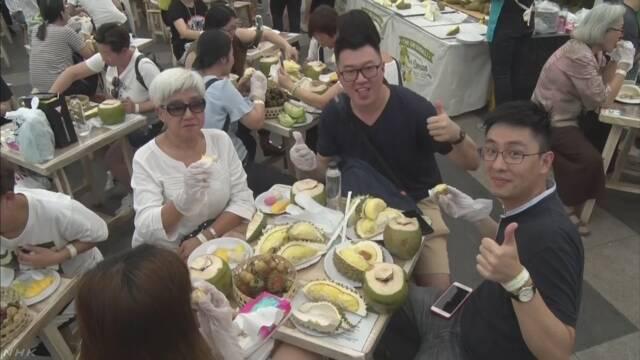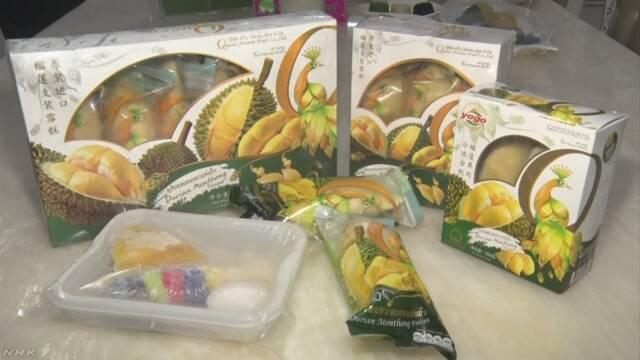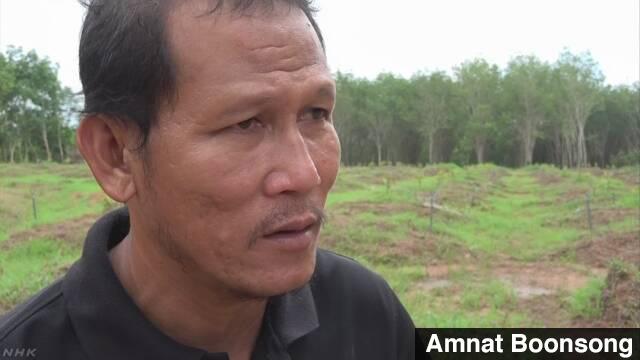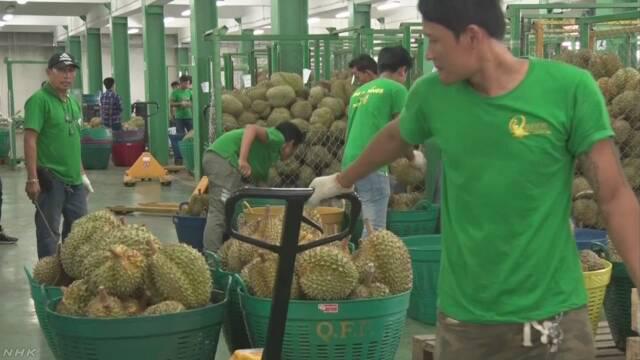Chinese Tourists Drive Boom
A summertime all-you-can-eat durian event was held in Bangkok. Crowds pack the venue, enjoying as much of the fruit as they can handle. A closer look reveals signs in Chinese and a room filled with the Chinese language. While some locals are present, most of the participants are Chinese tourists.
Chinese tourists are driving the durian boom. Thailand is one of the most popular tourist destinations for Chinese travelers, with nearly 10 million visiting in 2017.
It's said many Chinese become addicted to durians in Thailand, and continue craving the fruit after returning home. Moreover, China's rising income has seen a growing middle class with money to spend.

The Thai government says the total value of durians exported to China in 2017 was about 8.6 billion Baht, or around 258 million dollars, a more-than-two-fold increase over the last 5 years. About 80 percent of the durians produced in Thailand is exported, and China is its largest buyer.
E-commerce Giant Takes Action
Frozen durian suppliers work at the sharp end of the boom. Hundreds of employees fill processing plants, cutting and packing at speed.
The variety of products is also expanding. Shoppers can buy durian ice cream, durian dessert with sticky rice and even durian lasagna.
And new factories are being built. The manager of this company says he expects sales to triple this year.

Chinese online shopping site Alibaba is getting involved. In April, Jack Ma, the executive chairman and co-founder of Alibaba visited Thailand to meet with Thai Deputy Prime Minister Somkid Jatusripitak. The two agreed to cooperate on selling Thai products, including durians, online.
Jack Ma highlighted the volumes his company can shift, including a special promotion in which 80,000 durians were sold in just one minute.
A month later, an Alibaba employee in charge of purchasing visited Thailand to inspect farms and decide which durians to buy.

Boom Impacts Farming Areas
The durian boom has even impacted the farming landscape in Thailand. An increasing number of farms are changing from cultivating natural rubber to durians.
Amnat Boonsong is one of them. He runs a farm in Chanthaburi Province in eastern Thailand and has been cultivating rubber for the past 15 years. Over the last few years, however, the price of rubber has slumped. He had a daily income of up to 2,000 Baht, or about 60 dollars, but that has dipped to around 400 Baht, or 12 dollars.

Thailand is the world's leading producer of natural rubber and China its leading destination for exports. China's growing economy had driven prices up after 2000, resulting in a rapid increase in rubber farms. But prices began to fall due to Myanmar and Cambodia planting more farms and pumping out rubber at lower prices.
It was around this time that the durian grew in popularity, pushing its price up. Amnat decided to cut down half of his rubber trees and replace them with durian. He says, while the rubber trees are like a part of his family, he has no choice if he's to raise his income.
If enough farms also switch to durian, it may eventually result in an oversupply. The Thai government, concerned about the issue, has begun surveying local farmers about what to do.

The story of Thailand's durians is just one more example of the tremendous power of new Chinese wealth.
China is now the world's second largest economy. While Japan was once Thailand's largest trading partner, the position was usurped by China 5 years ago.
Thailand and other Southeast Asian countries have, for better or worse, advanced their economies by increasing their dependence on China.
But now, the US and China are in the midst of escalating trade frictions. If this results in damage to the Chinese economy, it may very well affect the durian boom now being enjoyed by farmers in Thailand.

